National Infrastructure Plan for Skills
On 29 September 2015, HM Treasury, Infrastructure UK (now the Infrastructure and Projects Authority) and Commercial Secretary to the Treasury Lord O’Neill of Gatley published the National Infrastructure Plan for Skills setting out the results of skills analysis and modelling of the National Infrastructure Pipeline.
The report followed publication of Fixing the Foundations: Creating a more prosperous nation in July 2015, a government plan for increasing Britain’s productivity, which committed to; 3 million apprenticeship starts this Parliament, a vision to refocus vocational provision, simplifying and streamlining the number of qualifications and a network of technical institutes.
The National Infrastructure Pipeline lists planned government infrastructure projects, including those that are in very early stages where funding has not yet been secured and may not actually happen. It is a strategic planning tool providing transparency and certainty to help businesses plan and to give investors’ confidence. An updated infrastructure pipeline published July 2015 detailed £411 billion of investment in 564 projects and programmes from 2015/16 onwards with increasing investment in transport, energy, communications and environmental networks.
The National Infrastructure Plan for Skills suggests that meeting this demand will require that government and industry work together to ensure the right people and skills are available.
It suggest that:
- The pipeline creates a demand for over 250,000 construction and 150,000 engineering construction workers by 2020.
- This will require nearly 100,000 additional workers by the end of the decade.
- The skills blend required will change, meaning that around 250,000 of the existing workforce will need to be retrained and up-skilled over the next decade.
- Labour market mobility is limited by a lack of detail on demand and supply, fragmented approaches to skills planning and high levels of bespoke training.
The Plan presents the challenges faced under five main themes:
- Providing leadership and coordination.
- Improving data on supply and demand.
- Incentivising skills investment through procurement.
- Improving mobility and up-skilling the existing workforce.
- Encouraging young people and greater diversity.
Lord O’Neill said: “It is crucial we have the right people with the right skills in place to build and maintain our first-class infrastructure, essential to rebalancing our economy. This report is just the first step in addressing how we can work with industry to ensure our workforce’s competitiveness for the future. We’ll now develop a clear action plan, set to not only strengthen the economy by delivering our most ambitious projects from transport to energy, but improve the quality of citizen’s lives too.”
The Plan comes shortly after the start of a consultation for a new apprenticeships levy that will apply to the construction industry from April 2017. This may threaten the continued role of the Construction Industry Training Board. See Apprenticeships levy for more information.
[edit] Related articles on Designing Buildings Wiki
- Apprenticeships levy.
- Boardroom to building site skills gap survey.
- CIOB responds to skills strategy for Northern Ireland.
- CLC publishes Industry Skills Plan 2021-2025.
- Construction 2025.
- Construction Industry Training Board.
- Diversity in the construction industry.
- Farmer Review 2016: Modernise or die.
- Fixing the Foundations: Creating a more prosperous nation.
- Government construction and infrastructure pipelines.
- Government construction strategy.
- Government funded apprenticeship incentives.
- Infrastructure and Projects Authority.
- Infrastructure UK.
- National Infrastructure Plan.
- Nationally Significant Infrastructure Projects.
- Perkins review.
- Professional Qualifications Bill.
- Protection for apprenticeships.
- Skilled workforce unable to meet net zero ambitions.
- Skills to build.
- Skills strategy for Northern Ireland.
- Tackling the construction skills shortage.






